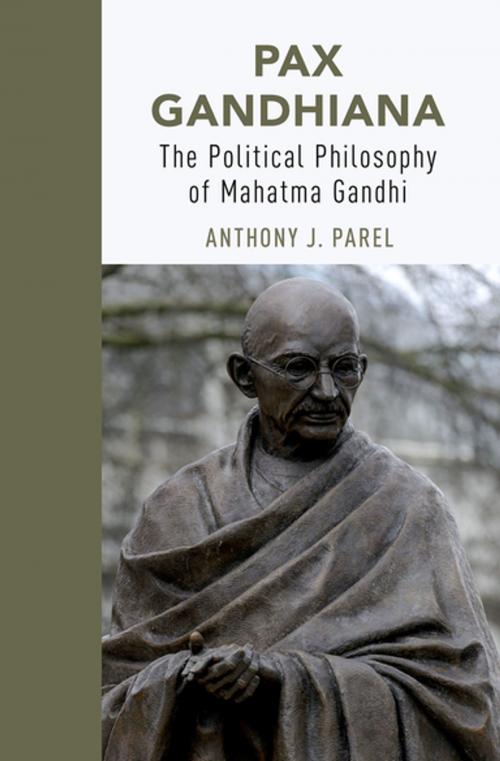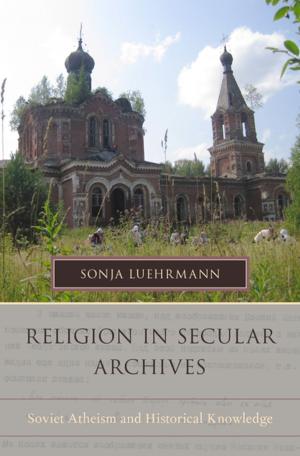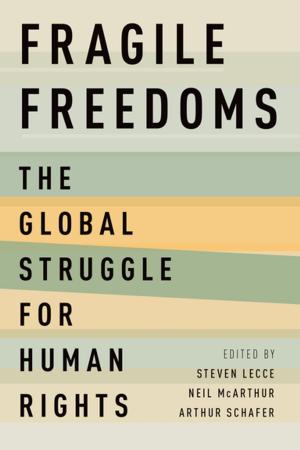Pax Gandhiana
The Political Philosophy of Mahatma Gandhi
Nonfiction, Religion & Spirituality, Philosophy, Political, Social & Cultural Studies, Political Science, Politics, History & Theory, International| Author: | Anthony J Parel | ISBN: | 9780190867478 |
| Publisher: | Oxford University Press | Publication: | January 2, 2018 |
| Imprint: | Oxford University Press | Language: | English |
| Author: | Anthony J Parel |
| ISBN: | 9780190867478 |
| Publisher: | Oxford University Press |
| Publication: | January 2, 2018 |
| Imprint: | Oxford University Press |
| Language: | English |
Notwithstanding his contributions to religion, nonviolence, civil rights, and civil disobedience, among other areas, Gandhi's most significant contribution is that as a political philosopher. While he is not often treated as such, Gandhi was, as Anthony J. Parel argues, a political philosopher sui generis, both in his philosophical method of constant self-criticism and his framework of philosophical analysis. Gandhi wrote daily on politics, but he did so as an activist; political philosophy was to him not just a way of understanding truths of political phenomena but was directly related to understanding those truths in action. If realized in action these truths would give rise to new political institutions, which in turn would create a corresponding peaceful political and social order. Parel dubs this order Pax Gandhiana. The main contention of Pax Gandhiana is that peace cannot be achieved by politics alone. Peace requires the confluence of the canonical ends of life: politics and economics (artha), ethics (dharma), forms of pleasure (kama), and the pursuit of spiritual transcendence (moksha). Modern political philosophy isolates politics from the other three ends, but Gandhi's originality, according to Parel, lies in the way that he brings all four together. In fact Gandhi's political philosophy is relevant not only to India but also to the rest of the world: it is a new type of sovereignty that harmonizes the interest of individual states with the community of states. Arguing against scholars who dispute a theoretical unity in Gandhi's writings, Parel suggests that Gandhi is the preeminent non-western political philosopher, and in this book he seeks to identify the conceptual framework of Gandhi's political philosophy, the Pax Gandhiana.
Notwithstanding his contributions to religion, nonviolence, civil rights, and civil disobedience, among other areas, Gandhi's most significant contribution is that as a political philosopher. While he is not often treated as such, Gandhi was, as Anthony J. Parel argues, a political philosopher sui generis, both in his philosophical method of constant self-criticism and his framework of philosophical analysis. Gandhi wrote daily on politics, but he did so as an activist; political philosophy was to him not just a way of understanding truths of political phenomena but was directly related to understanding those truths in action. If realized in action these truths would give rise to new political institutions, which in turn would create a corresponding peaceful political and social order. Parel dubs this order Pax Gandhiana. The main contention of Pax Gandhiana is that peace cannot be achieved by politics alone. Peace requires the confluence of the canonical ends of life: politics and economics (artha), ethics (dharma), forms of pleasure (kama), and the pursuit of spiritual transcendence (moksha). Modern political philosophy isolates politics from the other three ends, but Gandhi's originality, according to Parel, lies in the way that he brings all four together. In fact Gandhi's political philosophy is relevant not only to India but also to the rest of the world: it is a new type of sovereignty that harmonizes the interest of individual states with the community of states. Arguing against scholars who dispute a theoretical unity in Gandhi's writings, Parel suggests that Gandhi is the preeminent non-western political philosopher, and in this book he seeks to identify the conceptual framework of Gandhi's political philosophy, the Pax Gandhiana.















